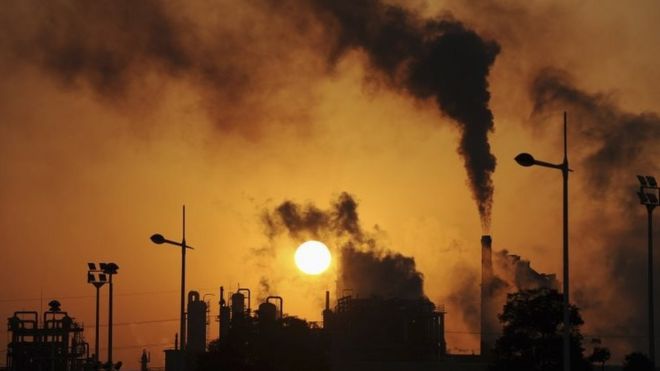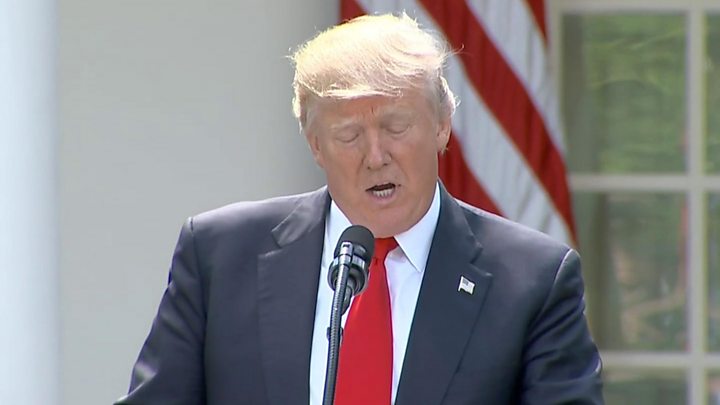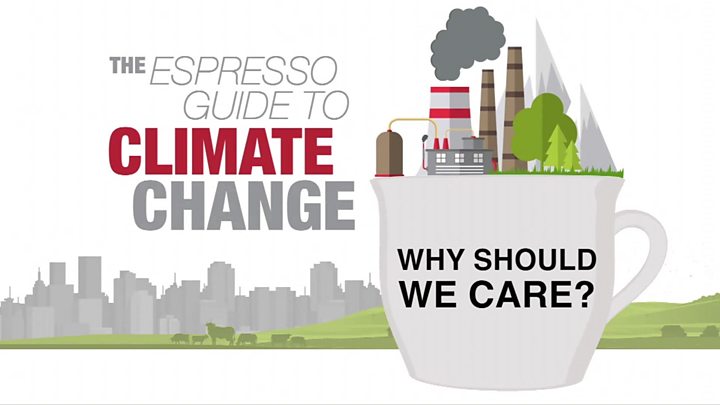Paris climate deal: US denies it will stay in accord
 REUTERS
REUTERS
The US has insisted it will leave the Paris climate accord, despite reports that it may be softening its stance.
Following a meeting of environment ministers on Saturday, the EU climate commissioner, Miguel Arias Canete, said Trump officials had indicated the US would either stay in the 2015 accord or review its terms.
But the White House insisted there had been "no change" in the US position.
In June President Donald Trump said the US would withdraw from the deal.
He said it was part of his "solemn duty to protect America" and he would seek a new deal that would not disadvantage US businesses.
But opponents say withdrawing from the accord is an abdication of US leadership on a key global challenge.
The Paris agreement commits the US and 187 other countries to keeping rising global temperatures "well below" 2C above pre-industrial levels and "endeavour to limit" them even more, to 1.5C.
Only Syria and Nicaragua did not sign up to the deal.
What did Trump originally announce in June?
Speaking in the White House Rose Garden, he characterised the Paris agreement as a deal that aimed to hobble, disadvantage and impoverish the US.
He claimed the agreement would cost the US 6.5 million jobs and $3tn (£2.2tn) in lost GDP - while rival economies like China and India were treated more favourably.

"In order to fulfil my solemn duty to protect America and its citizens, the United States will withdraw from the Paris climate accord... but begin negotiations to re-enter either the Paris accord or a really entirely new transaction on terms that are fair to the United States," he said.
During his visit to France in July, however, Mr Trump hinted that the US could shift its position on the deal - but did not elaborate.
"Something could happen with respect to the Paris accord... We'll see what happens."
What is now being reported?
On Saturday, the Wall Street Journal quoted Mr Arias as saying that Trump administration officials said the US would not pull out of the agreement, and were offering to re-engage in the deal.
The WSJ said the shift in the position came at a meeting of environment ministers from about 30 countries at a gathering in Montreal, Canada.
That meeting was attended by a US observer.

The US "stated that they will not renegotiate the Paris Accord, but they [will] try to review the terms on which they could be engaged under this agreement," Mr Canete said.
He said that "there would be a meeting on the sidelines of next week's UN General Assembly with American representatives "to assess what is the real US position", according to the AFP news agency.
"It's a message which is quite different to the one we heard from President Trump in the past," Mr Canete added.
At the same time, Chilean Environment Minister Marcelo Mena tweeted (in Spanish): "I was in the meeting, and the [US] negotiator effectively did not close the door on continuing in the agreement, and ruled out looking for a new agreement."
But in a statement later on Saturday, White House spokeswoman Sarah Huckabee Sanders said: "There has been no change in the United States' position on the Paris agreement,
"As the president has made abundantly clear, the United States is withdrawing unless we can re-enter on terms that are more favourable to our country."
How could this change things?
Bloomberg reported that the US is "no longer seeking to withdraw from the pact and then renegotiate it, but rather wants to re-engage with the Paris Agreement from within".
While the White House insists its stance has not changed, deciding not to withdraw from the Paris deal and instead focus on negotiating while remaining a signatory would represent a significant about-turn.
The Los Angeles Times said staying in the Paris deal would be "one of the most controversial" reversals of the Trump presidency.
It would also risk angering Mr Trump's more conservative supporters at a time he is facing criticism for engaging with Democratic leaders, the liberal magazine Mother Jones wrote.







No comments
Post a Comment